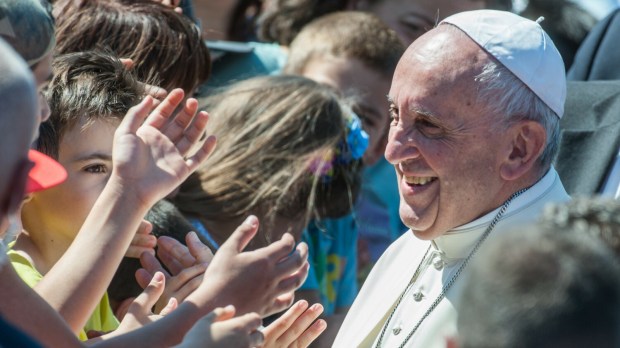On October 24, Pope Francis met with priests and seminarians living and studying in Rome. During this private audience he answered 10 of their questions — out of 200 they had prepared — and covered a wide range of topics. In speaking about the war in Ukraine, the relationship between faith and science, and the importance of learning the language of gestures, Pope Francis gave a roadmap on how to reach out to others, especially those we feel are farthest from us.
Pray for one’s aggressors
A Ukrainian priest asked Pope Francis what role the Church and the clergy should play in areas of conflict. First, the Pope underlined that the Church, “mother of all peoples,” suffers when “her children are fighting […] because wars are the destruction of her children.”
He thus explained that the Church must strive for peace and promote a universal love, even when facing aggressors.
“[The Church] is also a creative mother of peace: She tries to make peace in certain moments … In this case it is not very easy … […] It is true that there is one’s homeland, that is true, we must defend it. But go further, beyond that: a more universal love. And the Mother Church must be close to everyone, to all victims.”
“Indeed, pray for the sin of the aggressors, for the one who comes here to ruin my homeland, to kill my own: Do I pray for that? And this is a Christian attitude. You suffer so much, your people, I know, I am close. But pray for the aggressors, because they are victims like you. You cannot see the wounds in their souls, but pray, pray that the Lord will convert them and want peace to come.”
Acknowledge that having faith does not mean having all the answers
In answering a question about how to promote dialogue between science and faith, Pope Francis urged his audience to “never close the door” to discussion but to learn to communicate on the same level.
“First of all, I would say, listen, be open to the issues. […] And you don’t give one of those answers that used to be given in books made to answer all the difficulties against the Church, against our faith. They are answers that are not needed, they are purely theoretical, and we cannot offer them as answers that are up to the standard of a university student who is studying that specialty. We have to give an answer at the same level, worthy of a human, and this I think is very important: to look with wide, wide horizons …”
“There was a time when defense theology was fashionable and there were books with questions to defend. When I was a boy that was the method of defense. They were answers – some good, some closed – but not good for dialogue. ‘See? I answered you, I won.’ No, that doesn’t work.”
Speaking on the same level means also directing your interlocutor to a specialist in the field, if you do not know how to answer. Or, the Pope suggests, learn from Jesus’ example by responding with another question, to allow the person to reflect.
“Jesus did this often, we see it in the Gospel. To a question that contained a trap, Jesus would answer with another question, and leave the interlocutor in the middle of the intellectual journey,” the Pontiff said.
And if there is really no possibility to continue dialoguing, Pope Francis said “to be humble,” and recognize that “to have faith is not to have answers about everything.”
“To have faith, to have the grace to believe in Jesus Christ, is to be on a journey. And for the other person to understand that you are on a journey, that you don’t have all the answers to all the questions. […]
“The dialogue with science is always open. And being able to say: I can’t explain this to you, but you have to go to these scientists, these people who maybe will help you. Break out from the opposition between religion and science, because that is a bad spirit, that is not the true spirit of human progress. Human progress will keep science going and also conserve faith.”
Learn the language of gestures
Another step Pope Francis encouraged is learning the language of gestures from the most vulnerable, such as children or old people, which can then teach us tenderness, closeness, and compassion.
“There are three languages that show you the maturity of a person: the language of the head, the language of the heart, and language of the hands. And we have to learn to express ourselves in these three languages: that I think what I feel and do, feel what I think and do, do what I feel and think.”
“God’s style, don’t forget, is always closeness, compassion, and tenderness. And if you are close, with compassion and tenderness, you are on the right path,” he emphasized.
Recalling his own experience of a lung operation when he was 21 years old, Pope Francis explained how his family members and friends tried to offer him words of comfort such as “You’ll feel better soon,” or “You’ll be able to play again.” However, what touched him most was when the Sister who had prepared him for First Communion came to visit and said, “You are imitating Jesus.”
“That consoled me. Please, when you go to a sick person, don’t fill motivation with promises of the future. The gesture of closeness speaks more with presence than with words,” the Pontiff said.



